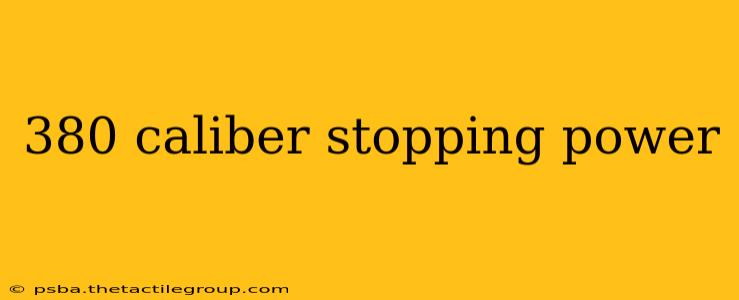The .380 ACP (Automatic Colt Pistol) cartridge, while a popular choice for concealed carry, often sparks debate regarding its stopping power. Understanding its effectiveness requires examining various factors beyond simple bullet energy. This article delves into the nuances of .380 stopping power, providing a balanced perspective for informed decision-making.
Understanding "Stopping Power": More Than Just Energy
The term "stopping power" is often misunderstood. It doesn't solely refer to the kinetic energy a bullet possesses upon impact. While energy plays a role, several other crucial factors influence a round's effectiveness in stopping an attacker:
-
Shot Placement: Accurate placement in vital areas, such as the central nervous system or heart, is paramount. Even a high-energy round will be less effective if it strikes non-critical areas. Precise shot placement is significantly more important than the caliber itself.
-
Bullet Expansion: The ability of a bullet to expand upon impact increases its wound channel, causing greater tissue damage and potentially incapacitating the attacker faster. .380 ACP ammunition varies significantly in its expansion characteristics. Hollow-point designs are generally preferred for their enhanced expansion capabilities compared to full metal jacket rounds.
-
Caliber and Penetration: While .380 ACP offers less penetration than larger calibers, sufficient penetration is necessary to reach vital organs. Over-penetration, however, is a significant concern in populated areas.
-
The Human Factor: Individual response to injury varies greatly. Factors such as adrenaline, pain tolerance, and overall physical condition influence how quickly an attacker is incapacitated.
.380 ACP: Strengths and Weaknesses
Strengths:
-
Concealability: The relatively small size and manageable recoil of the .380 ACP make it ideal for concealed carry, allowing for more comfortable everyday carry.
-
Availability: Ammunition is widely available and relatively affordable compared to some larger calibers.
-
Recoil Management: The lower recoil makes it easier for individuals with smaller frames or less shooting experience to manage and control the firearm accurately.
Weaknesses:
-
Limited Stopping Power Compared to Larger Calibers: Compared to rounds like 9mm or .45 ACP, the .380 ACP generally has lower stopping power due to lower energy and smaller bullet diameter. However, proper shot placement can mitigate this.
-
Penetration Concerns: While adequate penetration is crucial, over-penetration can be a danger in densely populated environments.
-
Dependence on Ammunition Quality: The effectiveness of a .380 ACP round heavily relies on the quality of the ammunition used. Choosing high-quality, expanding ammunition is vital.
Choosing the Right Cartridge: A Personal Decision
The suitability of the .380 ACP depends heavily on individual needs and circumstances. Factors such as experience, physical capabilities, and intended use heavily influence the best choice. For concealed carry, the .380 ACP offers a balance between concealability and stopping power, but it is essential to acknowledge its limitations and focus on proper training and shot placement. A smaller round necessitates superior marksmanship and strategic shot placement to compensate for its lower energy output.
Conclusion: Informed Choices are Crucial
While the .380 ACP's stopping power may be less than larger calibers, it remains a viable self-defense option when paired with proper training, high-quality ammunition, and a strong emphasis on accurate shot placement. Thorough research and informed decision-making, guided by professional instruction, are crucial when choosing a caliber for self-defense. Always consult with firearms experts and undergo comprehensive training before carrying any firearm.

